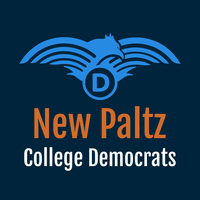
“We’re too siloed,” said Asilia Franklin-Phipps, assistant professor of English with a focus on race and racism. “So, I appreciate the opportunity to travel across the boundaries of disciplines. We need to refuse structures and hierarchies that position us differently.”
This was the goal of the New Paltz College Democrats’ event, “Talking Across the Line” on Thursday, Nov. 16, formatted as an interdisciplinary panel discussion in the Lecture Center, room 108, at 6:30 p.m. Speakers included professors Weldon McWilliams, Daniel Lipson, Franklin-Phipps and Joan Mandle, executive director of the Democracy Matters Institute.
Partnered with Democracy Matters, the Political Science and International Relations Association and the New York Public Interest Research Group, the intent was to encourage the creation of brave spaces where productive conversations can take place.
The night began with pre-submitted questions, presented by two moderators from the New Paltz College Democrats, focusing on ways we can transform/reinvent how to have deep, meaningful conversations about complex issues.
McWilliams discussed how being surrounded by a variety of viewpoints is incredibly educational and beneficial to understanding the world as it actually is: a culmination of unique human beings who come from different backgrounds and experiences, who are equally valid.
Then the discussion progressed toward issues of American ignorance and monolingual versions of history.
“As Americans, we are often taught very selective, modern, medical versions of history that ignore other issues,” Franklin-Phipps offered.
McWilliams brought up a Civil War era concept, of a white and black man at a table. They have to lay everything out, get all their concerns and views into the open, to understand social structures and hierarchies so that there can be mutual understanding and common ground.
Reforming democracy through social movements was a big emphasis throughout the panel. Mandle was especially passionate about the role young people can play in this revolution. She advocated for the open, tolerant and respectful discussion that is essential, so all points of view can be heard and an informed citizenry can make thoughtful decisions.
Her message is about changing the orientation/lense through which the world is viewed.
“There’s a really narrow, sweet spot,” said Lipson. “My hope is that we all aspire to reach that place of knowing the future of humanity is really in peril and ask, how can I find happiness and peace in the face of destruction or adversity?”
“So what if the world is ending?” Franklin-Phipps asked. This is a world where human-centeredness is a way of public policy, centered around consumption, destruction and death. “That’s actually quite hopeful,” she said. We have the chance to reimagine a world that includes the collective responsibility for the human family and environment. The future is not determined. All sorts of things are possible.
Collectively, the panelists pushed for connecting dialogue and action–involvement in politics and being generously engaged in conversations that meaningfully acknowledge the feelings of those involved, being intimately aware of hierarchies of power, building relationships that are full of complexity and mutual respect.
As it wrapped up, the event offered numerous insights to consider.
“I left with a great appreciation for SUNY New Paltz,” Franklin-Phipps said. “The people on the panel showed a lot of dedication and spoke honestly from their differing perspectives. I see a lot of possibility on this campus.”
Difficult conversations are a phenomenon that should be constantly continuing and evolving. It is the role of citizens in a democracy to engage in these, to understand the world and to gain insight into the human experience.
To learn more about the New Paltz College Democrats or continue engaging in these discussions, check out their Instagram @npcollegedems or attend a meeting on Wednesday nights at 7 p.m. in SUB 416.
